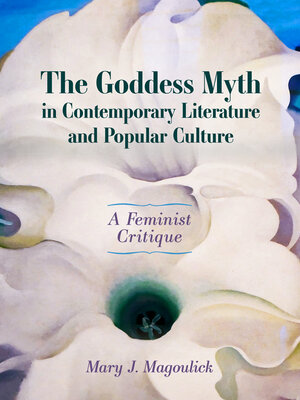The Goddess Myth in Contemporary Literature and Popular Culture
ebook ∣ A Feminist Critique
By Mary J. Magoulick

Sign up to save your library
With an OverDrive account, you can save your favorite libraries for at-a-glance information about availability. Find out more about OverDrive accounts.
Find this title in Libby, the library reading app by OverDrive.



Search for a digital library with this title
Title found at these libraries:
| Library Name | Distance |
|---|---|
| Loading... |
Honorable Mention for the 2022 Elli Köngäs-Maranda Prize awarded by the Women's Section of the American Folklore Society
Goddess characters are revered as feminist heroes in the popular media of many cultures. However, these goddess characters often prove to be less promising and more regressive than most people initially perceive. Goddesses in film, television, and fiction project worldviews and messages that reflect mostly patriarchal culture (included essentialized gender assumptions), in contrast to the feminist, empowering levels many fans and critics observe.
Building on critiques of other skeptical scholars, this feminist, folkloristic approach deepens how our remythologizing of the ancient past reflects a contemporary worldview and rhetoric. Structures of contemporary goddess myths often fit typical extremes as either vilified, destructive, dark, and chaotic (typical in film or television); or romanticized, positive, even utopian (typical in women's speculative fiction). This goddess spectrum persistently essentializes gender, stereotyping women as emotional, intuitive, sexual, motherly beings (good or bad), precluded from complex potential and fuller natures. Within apparent good-over-evil, pop-culture narrative frames, these goddesses all suffer significantly.
However, a few recent intersectional writers, like N. K. Jemisin, break through these dark reflections of contemporary power dynamics to offer complex characters who evince "hopepunk." They resist typical simplified, reductionist absolutes to offer messages that resonate with potential for today's world. Mythic narratives featuring goddesses often do, but need not, serve merely as ideological mirrors of our culture's still problematically reductionist approach to women and all humanity.
Goddess characters are revered as feminist heroes in the popular media of many cultures. However, these goddess characters often prove to be less promising and more regressive than most people initially perceive. Goddesses in film, television, and fiction project worldviews and messages that reflect mostly patriarchal culture (included essentialized gender assumptions), in contrast to the feminist, empowering levels many fans and critics observe.
Building on critiques of other skeptical scholars, this feminist, folkloristic approach deepens how our remythologizing of the ancient past reflects a contemporary worldview and rhetoric. Structures of contemporary goddess myths often fit typical extremes as either vilified, destructive, dark, and chaotic (typical in film or television); or romanticized, positive, even utopian (typical in women's speculative fiction). This goddess spectrum persistently essentializes gender, stereotyping women as emotional, intuitive, sexual, motherly beings (good or bad), precluded from complex potential and fuller natures. Within apparent good-over-evil, pop-culture narrative frames, these goddesses all suffer significantly.
However, a few recent intersectional writers, like N. K. Jemisin, break through these dark reflections of contemporary power dynamics to offer complex characters who evince "hopepunk." They resist typical simplified, reductionist absolutes to offer messages that resonate with potential for today's world. Mythic narratives featuring goddesses often do, but need not, serve merely as ideological mirrors of our culture's still problematically reductionist approach to women and all humanity.







